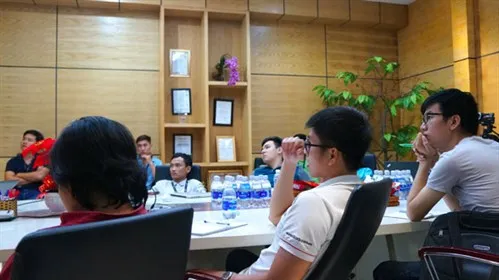
News
Table Of Content
Overview of the Training Session
Introduction to NodeJS
Cross-Compiling NodeJS and Node Package Manager (NPM)
Setting Up the Development Environment
Building RESTful Web Services Using Express
Documenting APIs with Swagger
Writing Unit Tests Using Mocha
Interactive Q&A Session
Summary of Participant Takeaways
Acknowledgment
NODEJS Training Course On Dec
NodeJS is a platform built on Chrome’s Javascript runtime for easily building fast, scalable network applications. It is most popular modern server technology and highly preferable for real-times apps in Vietnam software outsourcing company. Learn NodeJS is an efficient way to add server-side Javascript to your skill-set.
18 Dec 2017
On December 6th, 2017, a NodeJS training course took place at S3Corp from 2:00 PM to 3:30 PM. The course aimed to introduce practical and foundational knowledge of NodeJS, a popular JavaScript runtime environment used widely for building fast and scalable server-side applications.
Overview of the Training Session
The training course was conducted by Mr. Quang Nguyen, a Technical Architect with over 7 years of software development experience. His background in full-stack development and architecture gave participants real-world insights into using NodeJS in actual software projects. The training followed a hands-on approach with guided demonstrations and knowledge sharing based on real project use.
Introduction to NodeJS
The session began with an introduction to NodeJS. It is a platform built on Chrome’s V8 JavaScript engine and is designed for building scalable and efficient network applications. Unlike traditional server-side technologies that rely on multi-threaded request handling, NodeJS uses a non-blocking, event-driven architecture. This design helps manage multiple connections concurrently without creating multiple threads.
NodeJS is widely used in Vietnam software outsourcing companies. Its speed, efficiency, and active ecosystem make it a top choice for developing real-time applications such as chat apps, collaborative tools, and streaming platforms.
Participants learned the significance of using JavaScript on both client-side and server-side, improving productivity and consistency in development.
Cross-Compiling NodeJS and Node Package Manager (NPM)
The training covered how to install and set up NodeJS across different environments. Participants explored how to work with the Node Package Manager (NPM), a core part of the NodeJS ecosystem. NPM allows developers to manage open-source packages, libraries, and project dependencies efficiently.
During the session, attendees were shown how to:
-
Install NodeJS and NPM
-
Configure NPM for development
-
Understand package.json structure
This section gave a clear foundation for managing server-side development workflows.
Setting Up the Development Environment
The training course provided guidance on setting up a productive NodeJS development environment. Mr. Quang introduced the tools and configurations commonly used by development teams at S3Corp for NodeJS projects.
Participants practiced:
-
Installing Visual Studio Code as the editor
-
Setting up ESLint for code quality
-
Configuring scripts for development and testing
This setup allowed attendees to work efficiently and maintain code consistency across teams.
Building RESTful Web Services Using Express
One of the main focuses of the course was creating RESTful APIs using the Express framework. Express is a minimal and flexible NodeJS web application framework that simplifies the process of building robust APIs.
The session included:
-
Setting up an Express project
-
Creating GET, POST, PUT, DELETE routes
-
Managing request and response objects
-
Handling errors in routes
This hands-on section helped developers understand how REST APIs function and how Express facilitates clean route definitions and middleware integration.
Documenting APIs with Swagger
Mr. Quang introduced Swagger for API documentation. Swagger is an open-source tool that helps describe, produce, consume, and visualize RESTful web services.
Attendees were guided through:
-
Adding Swagger to an Express project
-
Creating OpenAPI specifications
-
Generating interactive API documentation
This section emphasized the importance of good documentation for maintainability and ease of collaboration, especially in outsourced software development environments where clear communication is key.
Writing Unit Tests Using Mocha
To ensure code reliability, the course included a unit testing module using Mocha. Mocha is a test framework running on NodeJS, which supports asynchronous testing and provides clear reporting.
The session demonstrated:
-
Setting up Mocha in a NodeJS project
-
Writing simple test cases for API endpoints
-
Running tests and interpreting outputs
This part of the course aimed to reinforce best practices in quality assurance through automated testing.
Interactive Q&A Session
The final section of the training was an open Q&A. Participants had the opportunity to ask technical questions and clarify points from earlier segments. Mr. Quang provided answers based on his experience in real-world projects, offering deeper insights into NodeJS use cases and performance tips.
Summary of Participant Takeaways
By the end of the training, attendees had gained practical skills and foundational knowledge in:
-
Understanding NodeJS architecture
-
Working with NPM
-
Setting up development tools
-
Building RESTful APIs with Express
-
Documenting APIs using Swagger
-
Writing and running tests with Mocha
The session offered a comfortable and engaging learning experience. Many participants appreciated the clear examples and real project references, making it easier to understand how to apply the concepts in their day-to-day work.
Acknowledgment
S3Corp extends its thanks to Mr. Quang Nguyen for delivering a well-structured and informative session. His practical approach and friendly teaching style contributed to a productive learning environment. Appreciation is also given to all attendees for joining the session and engaging actively in the discussions.
This NodeJS training course was one of the knowledge-sharing activities regularly held at S3Corp to support the continuous growth of its development teams and to promote technical excellence across projects.



_1746790910898.webp&w=384&q=75)
_1746790956049.webp&w=384&q=75)
_1746790970871.webp&w=384&q=75)
